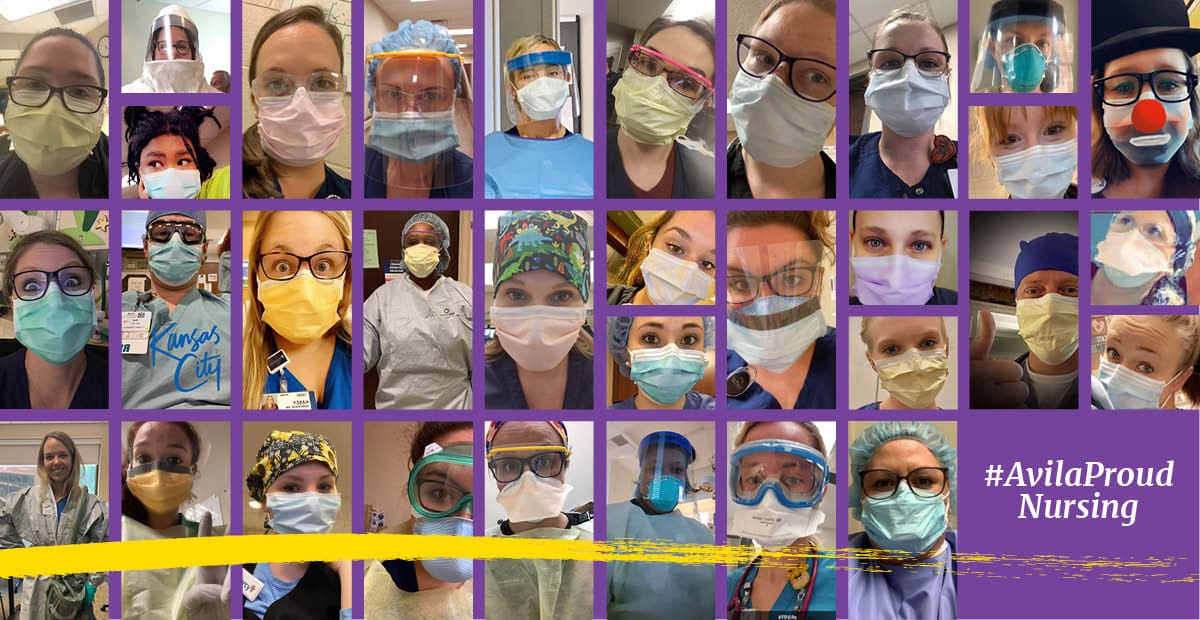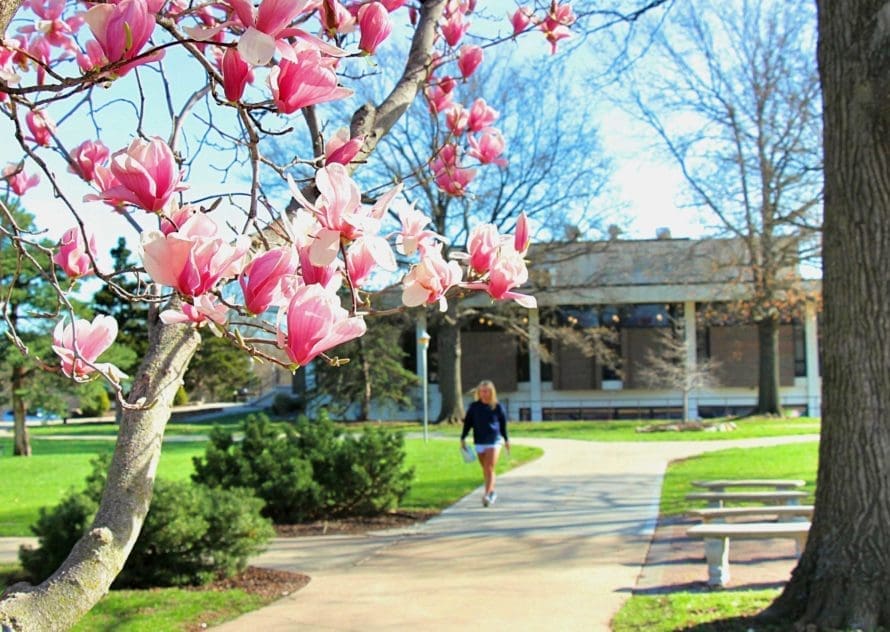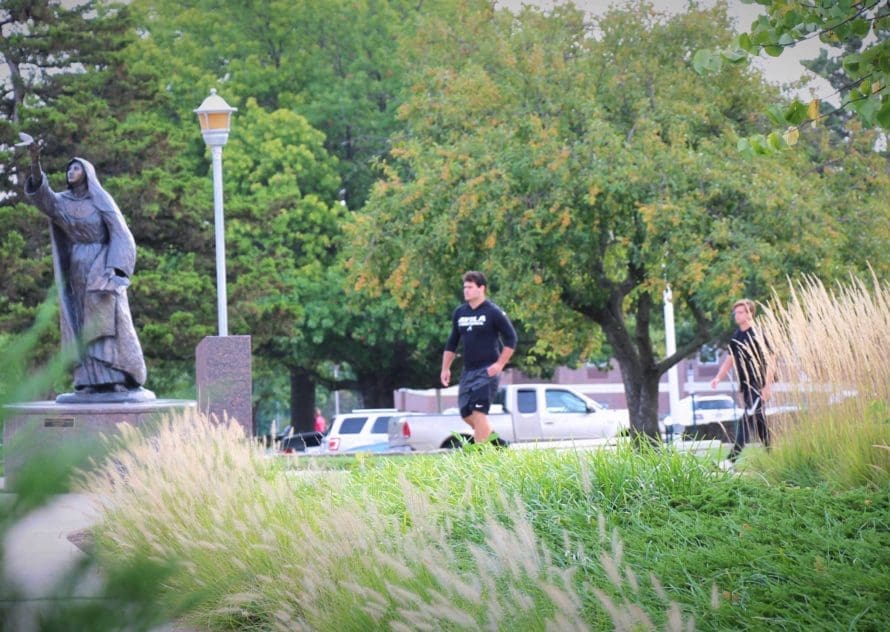Accreditation & Approval
The Avila School of Nursing has full approval for the prelicensure programs from the Missouri State Board of Nursing. The baccalaureate degree programs in nursing at Avila University is accredited by the Commission on Collegiate Nursing Education.
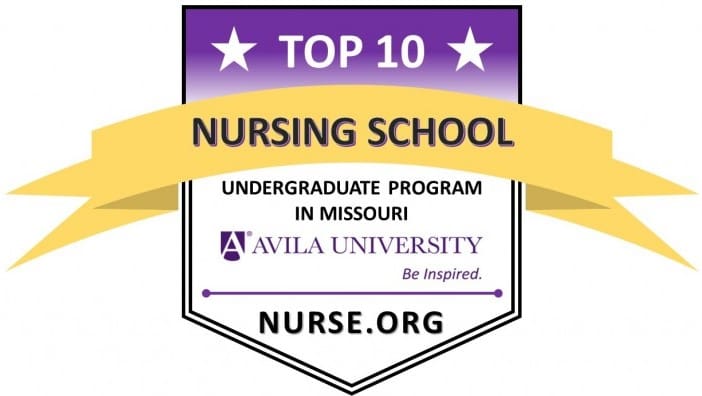
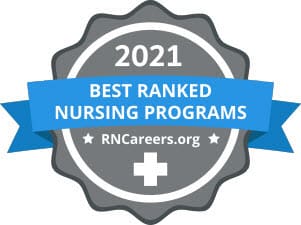
Avila University’s School of Nursing is a nurturing, innovative, and rigorous program designed to prepare compassionate, confident, and competent nursing professionals.
Preparing Nursing Leaders in Missouri and Across the Country.
For more than 77 years, Avila University’s School of Nursing in Kansas City, Missouri, enjoys an outstanding reputation for preparing leaders in the field – the result of an innovative, 21st-century curriculum.
Students at Avila University are motivated and committed to their education. They are taught by faculty with significant clinical experience, and employers seek after graduates of Avila’s nursing program.
Choose Your Pathway
The School of Nursing provides two prelicensure and one post-licensure pathways to earning a Bachelor of Science in Nursing degree
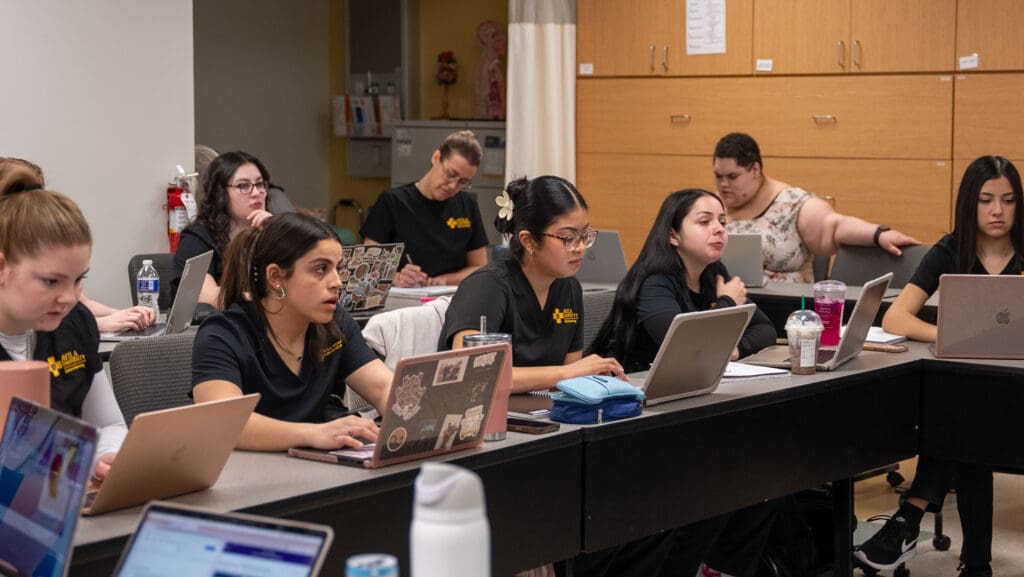
Traditional Bachelor of Science in Nursing
A traditional on-campus nursing pathway for students beginning their nursing education.

Accelerated Bachelor of Science in Nursing
An accelerated pathway designed for students who have 60 or more college credits.
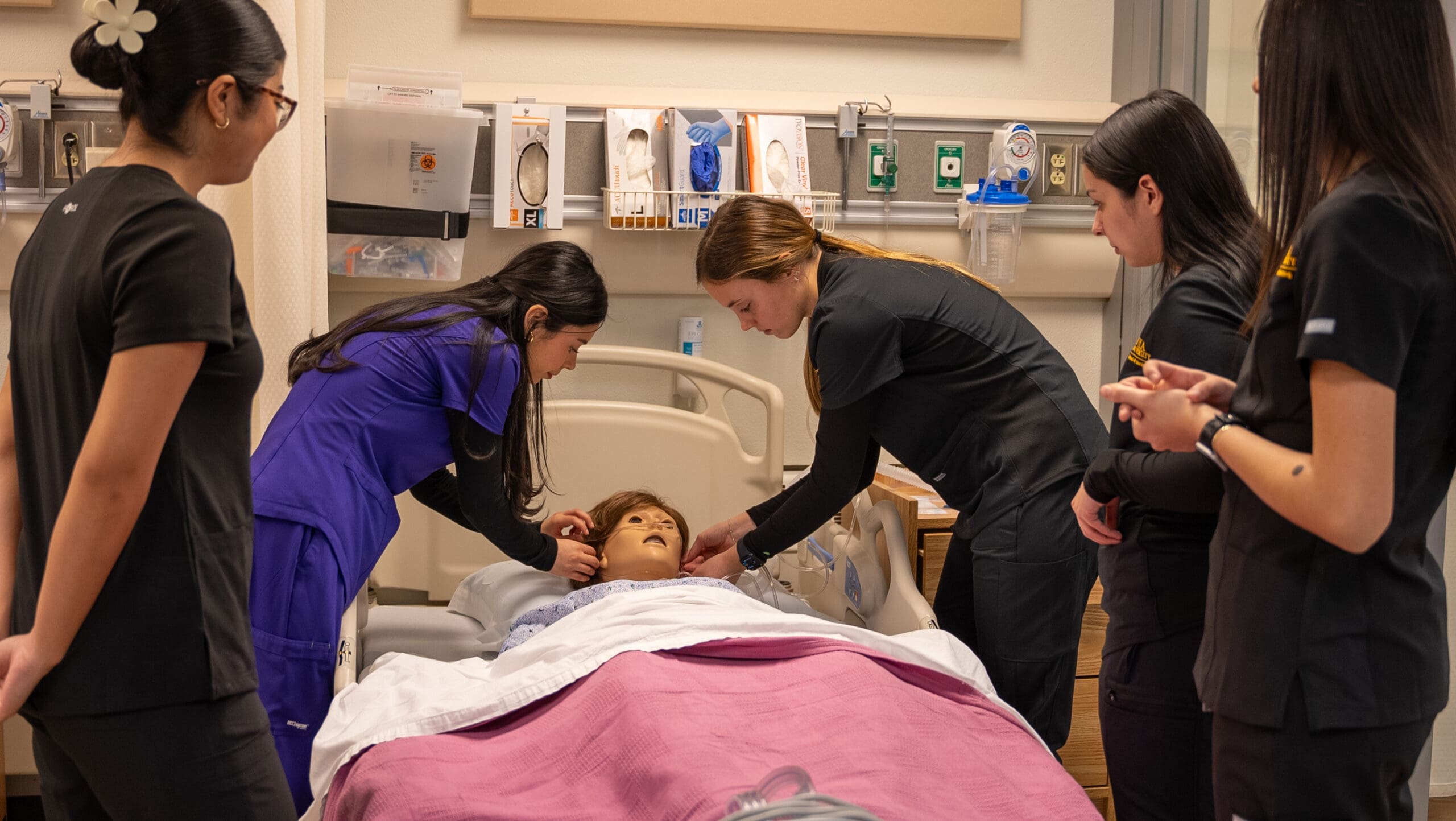
RN-BSN
A flexible program for licensed registered nurses seeking to advance their education with a BSN degree.
Why Nursing School at Avila?
Because of our strengths.
- Avila nursing students are motivated, intelligent, committed, and highly capable.
- Faculty with clinical and academic experience, energy, and commitment to progressive nursing education.
- The Avila nursing curriculum prepares you for the future and provides a wide variety of clinical experiences, including many community-based clinical experiences.
For a satisfying career…
- Avila has an outstanding reputation as one of the oldest baccalaureate programs of nursing in the metropolitan area, and one that prepares students for nursing careers and nursing leadership positions.
- The Avila nursing graduate is well prepared to begin a successful nursing career in a variety of settings and to contribute to nursing membership and activity in professional nursing organizations.
- Avila nursing graduates are/have been employed in the following positions of nursing leadership: directors of agencies including home health and long-term care facilities; hospital administrator of a rural community hospital in Kansas; entrepreneur in the field of nurse executive placement; leadership roles of the American Nurses’ Association; executive director of a national research project based in Kansas City to enhance underprivileged family well-being, nursing program directors and faculty.
To experience our Nursing Education and Resource Center (NERC)
- The NERC provides a simulated hospital environment where students learn to assist patients and provide basic to intensive nursing skills.
- The NERC provides meeting and workspace for independent and group study.
For Our Simulation Program
Nursing students participate in a variety of simulations throughout the nursing program, including virtual simulations, high-fidelity simulations, mass casualty simulations, and home healthcare simulations. Simulation and the strong debriefing process allow students to build teamwork, enhance clinical judgment, and reflect on their own actions in a variety of clinical situations.
Nursing Resources
American Association of Colleges of Nursing (AACN)
American Nurses Association (ANA)
Commission on Collegiate Nurse Education (CCNE)
National Council State Board of Nursing (NCSBN)
Pearson Professional Centers
Home Care Nursing
Kansas
Kansas State Board of Nursing (KSBN)
Kansas State Nurses Association (KSNA)
Missouri
Missouri Division of Professional Registration (MSBN)
Missouri League for Nursing (MLN)
Missouri Nurses Association (MONA)
Licensure in other states
Completion of the Avila University Bachelor of Science in Nursing program meets educational requirements to apply for the NCLEX exam for Registered Nurses (RNs). Application for initial licensure may be requested through any state board of nursing. Completion of the Bachelor of Science in Nursing degree through Avila University meets the educational requirements for the states of Missouri and Kansas. Information related to eligibility for initial licensure in other states is available on the websites for each individual state. Most states require submission of course transcripts for review prior to granting approval.
Avila University School of Nursing (AU SON) has attempted to determine which states accept graduates of the school of nursing for initial licensure. Any student who plans to seek initial licensure in a state other than Missouri or Kansas is counseled to contact the Board of Nursing of that state to ensure that they will be eligible for seeking licensure in that state. Graduation from AU SON does not guarantee eligibility to sit for the National Council Licensure Examination for the Registered Nurse (NCLEX-RN).
The U.S. Department of Education via Regulations for Title IV require that AU SON publicly disclosure the following:
- a list of all states/jurisdictions where the institution’s curriculum meets state educational requirements for professional licensure or certification
- a list of all states/jurisdictions where the institution’s curriculum does not meet state educational requirements for professional licensure or certification
Disclaimer: This information, which is fluid and ever-evolving, has been gathered from a variety of sources. Although Avila SON has made every effort to provide complete, accurate and up-to-date information, we cannot guarantee the completeness and accuracy of this information.
At this point in time (July 1, 2024) Avila University SON’s curriculum meets the educational requirements for licensure in the following states and territories:
Alabama, Alaska, Arizona, Arkansas, Delaware, Florida, Georgia, Idaho, Illinois, Indiana, Iowa, Kansas, Kentucky, Louisiana, Maine, Maryland, Massachusetts, Michigan, Minnesota, Mississippi, Missouri, Montana, Nebraska, Nevada, New Hampshire, New Jersey, New Mexico, New York, North Carolina, North Dakota, Oklahoma, Ohio, Pennsylvania, Rhode Island , South Carolina, South Dakota, Texas, Utah, Vermont, Virginia, Washington, West Virginia, Wisconsin, Wyoming, Guam, Northern Mariana Islands, U.S. Virgin Islands
At this point in time (July 1, 2024) Avila University SON’s curriculum DOES NOT meet the state educational requirements for licensure in the following states and territories:
California , Colorado , Connecticut, District of Columbia, Hawaii, Oregon, American Samoa
Mission:
Guided by the values of Avila University, the School of Nursing is dedicated to preparing nurses who provide patient-centered, evidence-based holistic care. By integrating ethical principles and interdisciplinary approaches, we aim to develop innovative and socially responsible healthcare professionals. Through transformative education and mentorship, we strive to improve health outcomes and make a meaningful impact on the communities we serve.
Vision:
To empower and inspire excellence and integrity in the next generation of nurses.
Values:
Avila School of Nursing lives the values set forth by Avila University. These values include:
• The worth, dignity, and potential of each human being
• Excellence in teaching and learning
• Service with the dear neighbor
• Diversity and its expression
• The development of the whole person
• Right relationships with God, self, others, and creation
- Promote individual growth and mentorship.
- Foster a culture that values adaptability, strives for excellence, and upholds integrity.
- Implement a dynamic learning environment that promotes intellectual curiosity and a commitment to life-long learning.
The rich history Avila University enjoys is rooted in the Sisters of St. Joseph, founded in LePuy, France in 1650 to respond to the needs of society by serving their neighbors.
In 1836, six Sisters arrived in America and traveled the Mississippi River to St. Louis, Missouri, and settled in a small town south of the city known as Carondelet. These women established several schools and were soon known as the Sisters of St. Joseph of Carondelet (CSJs).
In 1866, six Sisters came to Kansas City, Missouri, and opened the first private high school for young women, St. Teresa’s Academy.
In 1916, the academy administration chartered the first private college for women in Kansas City, St. Teresa’s College. The college offered a two-year program leading to an Associate of Arts Degree. Fifteen years later, St. Joseph’s Hospital School of Nursing, also associated with the Sisters of St. Joseph of Carondelet, became affiliated with the college and nursing students were enrolled in basic science and humanities courses.
In 1940, the college became the first four-year, liberal arts institution for women in Kansas City with professional programs in nursing, education, and business and was renamed The College of St. Teresa. The growth of the College of St. Teresa resulted in a move to its present campus in 1963.
In honor of St. Teresa of Avila, the college changed its name to Avila College. Seeking to serve a diverse population, the college became co-educational in 1969 and established graduate programs in business, education, and psychology in 1978.
Due to its continued growth as a comprehensive institution of higher learning, offering undergraduate and graduate programs, Avila College became Avila University in 2002; departments became schools or colleges and department chairs became deans. Subsequently, the department of nursing became the school of nursing and the department chair became dean.
In 1974, Avila became the first liberal arts college to establish a Sigma Theta Tau, International chapter—Beta Lambda. Avila and the University of Central Missouri created an at-large chapter in 2008. With declining activity and following much discourse, the chapter was closed in 2012.
Since it began in 1916, Avila University has been committed to excellence in teaching and learning in an environment that respects the uniqueness of each person and stresses responsible life-long contributions to the community. This commitment reflects the mission and purpose of the Sisters of St. Joseph of Carondelet, who continue to sponsor Avila University. The university was initially accredited by the North Central Association of Colleges and Schools in 1946. The university has enjoyed continuous accreditation since then. At its last comprehensive visit in 2008, Avila University received continued regional accreditation for a period of ten years. The nursing program received its first accreditation from the Missouri State Board of Nursing (MSBN) in 1948, the National League for Nursing (NLN) in 1966, and the Commission on Collegiate Nursing Education (CCNE) in 2000. The program has had continuous accreditation since that time. In 2020, the program applied for and was awarded reaccreditation by the CCNE for the maximum time period of 10 years. The program has full approval by the MSBN.
Nursing education at Avila University provides the academic preparation of nurses who contribute to the health care of those in need. This educational vision was made possible through the efforts of the Sisters of St. Joseph of Carondelet mission at St. Joseph Hospital (now St. Joseph Medical Center) and many others at the College of St. Teresa and Avila College (now Avila University) who valued the importance of academic preparation for nursing practice. The Sisters of St. Joseph established the St. Joseph Hospital School of Nursing in 1900 under the direction of Sister Irmenia Dougherty. This school of nursing became chartered in 1901. The development of the four-year nursing program originated after the close of World War II. The Sisters of St. Joseph of Carondelet recognized the need for advanced educational preparation for women in nursing and formulated plans to establish a department of nursing within the college.
Prior to September 1960, the college offered three programs in nursing: a three-year diploma program, a basic baccalaureate program, and a supplementary (continuing education) program for graduate registered professional nurses. In 1958, a decision was made to discontinue the three-year diploma program and to revise the curriculum of the baccalaureate program to enable the student to complete the requirements for a Bachelor of Science degree in four academic years. These changes took place in 1960. The SON continues the tradition of excellence in nursing through its undergraduate curriculum which provides the health care community excellent, well-educated nurses prepared to adapt to the ever-evolving health care environment.
Avila nursing outcomes
- Graduates report being able to easily secure employment after graduation.
- Graduates report high levels of satisfaction with their nursing major.
- Employers and alumni report satisfaction with their preparation for the nursing role.
- The curriculum reflects current trends in healthcare and nursing education including communication, clinical reasoning, leadership, scientific, and other professional skills that prepare the nurse for the future.
- Students give high ratings to the quality of teaching and courses in nursing.
Frequently Asked Questions
When do you admit students? We admit students to the TBSN and ABSN programs in the Fall and Spring. RN-BSN students can be admitted in Fall, Spring, and Summer semesters.
What previous college-level work will meet the requirements? A strong background in liberal arts and science courses is required to be ready for the nursing program. Equivalent courses are determined through a transcript evaluation. This is initiated through an application to Avila and a review of official transcripts. Students who believe they have knowledge competencies that are not reflected on the transcript evaluation can choose to test for competency in some courses or may petition for further consideration of course equivalency based, for example, on the substantiation of course content through course syllabi.
You can find course equivalencies between Avila and local 2-year institutions on our Transfer Student page.
Where do students at Avila receive clinical experiences? Nursing students participate in clinical courses in a variety of settings across the metropolitan area, reflecting the variety of settings in which nurses practice. These include acute care hospitals, outpatient clinics, schools, and hospices.
What documentation is required to participate in clinical experiences? Accepted students must:
- Provide immunization documentation and other Avila and clinical agency requirements prior to the beginning of and continuing throughout nursing clinical courses (these requirements are subject to change).
- Complete criminal disclosure information and background check.
- Complete an alcohol and drug screen.
- Hold current two-year certification through American Heart Association for Basic Life Support Health Care Professional.
- Provide proof of the absence of active Tuberculosis (2-step TB screen or IGRA)
- Carry health insurance coverage while in the nursing major (a health insurance form must reflect company and coverage, be provided annually, and be on file in the nursing office).
What resources do you have to assist with my learning? Avila provides Learning Services for students needing academic support. Career Services offers assistance in resume writing and interviewing skills. The Hooley-Bundschu Library & Learning Commons houses hundreds of videos, computer software, and interactive videos to assist the nursing student in the learning process. The Nursing Education and Resource Center houses low, medium, and high-fidelity simulators to provide practice opportunities in nursing interventions and clinical reasoning.
Do I need a car? Students must be responsible for their own transportation to clinical sites. Students typically drive themselves or carpool with other students.
Can I continue to participate in sports while attending nursing classes? Yes, we work with students to develop plans for continuing in their sports activities. Student-athletes learn to be proactive in studying and balancing their nursing courses and athletic obligations.
School of Nursing News
- Avila University Offers Accelerated Online Nursing Degree Program to Help Address Missouri’s and the Nation’s Critical Nursing Shortage
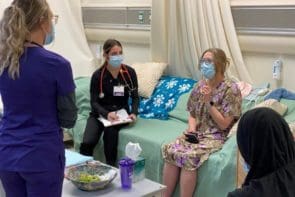 Avila University is pleased to announce it is now offering an Accelerated Bachelor of Science in Nursing (ABSN) degree. This degree completion program is for students with some college experience or…
Avila University is pleased to announce it is now offering an Accelerated Bachelor of Science in Nursing (ABSN) degree. This degree completion program is for students with some college experience or…
